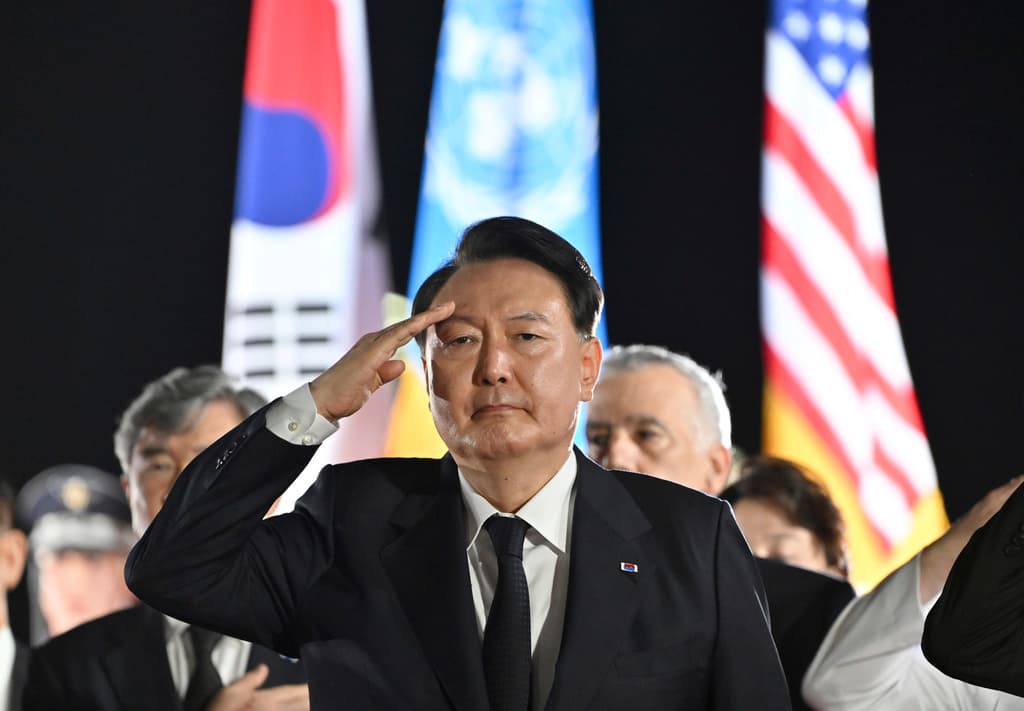South Korean President Faces Lengthy Jail Term for ‘Insurrection’ Following New Indictment
‘Korea’s likely next government, probably run by the opposition, may well follow policies that will find Seoul at odds with Washington.’ one analyst tells the Sun.

SEOUL — President Yoon Suk-yeol of South Korea faces an extended stay in prison with his sudden indictment Sunday on the charge of “insurrection” for declaring martial law last month and deploying troops to keep the national assembly from voting down his decree.
Prosecutors acted on almost an emergency basis in indicting Mr. Yoon after the district court rejected their request to hold him beyond Monday when he was due for release if not formally indicted. Prosecutors said they had not had time to question him since taking over the case from the high-level Corruption Investigation Office, which did not have the authority to indict him.
Mr. Yoon’s indictment marks another milestone in the ordeal of the first Korean president to be jailed while still in office. His imprisonment comes as a severe disappointment to American policymakers, with whom he had forged close ties while vastly strengthening the Korean-American alliance since his election as president by a margin of less than one percent in 2022.
Mr. Yoon, when impeached by the National Assembly, was automatically stripped of all authority but retained the title of president until the constitutional court approves his impeachment. In a system in which indictment usually results in conviction, his chances of regaining freedom appear bleak despite rising sympathy for him among Koreans bitterly opposed to the left-leaning Democratic, or Minju Party, that holds a strong majority in the assembly over Mr. Yoon’s conservative People Power Party.
If Mr. Yoon is ultimately removed from office, “the door may open to a new and no less dangerous crisis, this time in the U.S.-ROK alliance,” a former senior American diplomat in Seoul, Evans Revere, tells the Sun. “Korea’s likely next government, probably run by the opposition, may well follow policies that will find Seoul at odds with Washington.”
Complicating matters, President Trump has upset Koreans by remarking, when discussing his chances of meeting North Korea’s leader, Kim Jong-un, that Mr. Kim is “a nuclear power.”
“His description of North Korea as a ‘nuclear power’ has set off alarm bells in South Korea that the new U.S. administration might be prepared to formally accept North Korea as a nuclear weapons state,” says Mr. Revere. “Conservatives are going out of their way to question the Trump administration’s commitment to the strong nuclear-related assurances that the Biden administration provided the ROK.”
While the constitutional court is still reviewing his case, Mr. Yoon may well go on trial in a separate criminal court for “insurrection” — a charge that carries life imprisonment, or even the death penalty. Mr. Yoon has refused to talk to investigators.
His former defense minister, Kim Yong-hyun, also faces trial along with several military officers, for conspiring in what’s sometimes called a “coup against the government.”
Mr. Kim, who attempted to commit suicide after his arrest, is believed to have supported Mr. Yoon’s martial law decree, issued on December 3, by ordering troops to surround the assembly in order to keep members from voting on it. The Minju members got into the building and quickly voted to reject the decree, which Mr. Yoon rescinded six hours after he issued it. He has insisted the troops were there only to maintain order.
Regardless of whether he’s convicted of insurrection, if he’s ousted by the constitutional court, Koreans will vote for a new president in a snap election 60 days later. The Minju leader, Lee Jae-myung, whom Mr. Yoon defeated in 2022, is at the forefront of the effort to drive Mr. Yoon out of office and into jail — and would likely run again despite cases against him in real estate and corruption scandals.
The political crisis may get worse in the coming weeks as forces on both sides of the political spectrum organize protests. Spokespersons for both the Minju and the People Power Party vented outrage from their differing perspectives.
The Korea Times reported the People Power spokesperson, Shin Dong-wook, castigating prosecutors for their “appalling and sloppy indictment of the sitting president.” The Minju spokesperson, Han Min-soo, was quoted saying “attempts to incite far-right supporters with baseless allegations and delusions must stop.”

